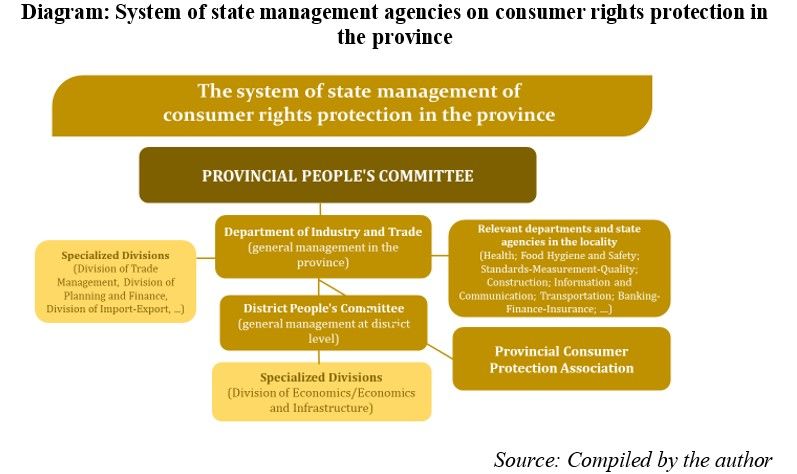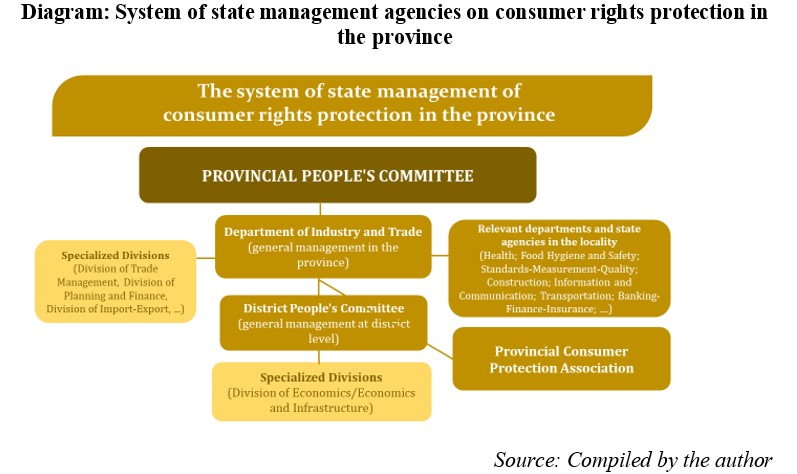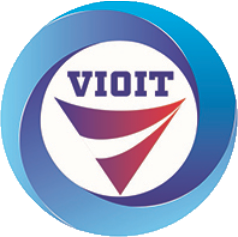
Assessment of the state management of consumer rights protection at the provincial level in Viet Nam
15:56 - 25/10/2022
MA. Phan The Thang
Vietnam Competition and Consumer Authority
Keywords: Consumer rights protection; State management of consumer rights protection; Provincial People's Committee; Department of Industry and Trade; Consumer protection association.
- Analysis of some of the results achieved so far
In the period 2011-2020, the state management of consumer rights protection in Viet Nam in general and in the provinces in the country in particular have achieved a numerous results. Notable results are as follows:
Firstly, for the planning and promulgation of legal documents about the state management of consumer rights protection by the Provincial People's Committees: it is carried out in a timely manner, the contents are closely related to the requirements and actual demand; has brought certain results in implementation activities.
The main contents and issues raised in the state management of consumer rights protection in the province have been mentioned and concretized in the programs, schemes, guidelines, …etc of the Provincial People's Committee. So far, we have basically built a relatively complete system of policies and legal documents on consumer rights protection. In addition to the most important document, the Law on consumer rights protection, the Government, the Prime Minister and relevant Ministries, … have developed a series of Decrees, Decisions, Circulars, Programs, Schemes... to adjust the related issues.
The Provincial People's Committees, Departments of Industry and Trade have actively followed and based on the directions of the Party, policies and laws of the State, plans, programs, directions of the Government, Prime Minister and the superior state agencies to develop and promulgate the implementation documents in their provinces.
Secondly, for state management tools on consumer rights protection: has been focused to improve and to be applied effectively and systematically; shows the role of state management in the economy through the organizational system of management agencies, the system of legal documents of consumer rights protection from the central to local levels.
Accordingly, the organization and implementation of the contents of state management on the consumer rights protection in the province have taken place synchronously in localities throughout the country; there is coordination and cooperation between local agencies and organizations, as well as between the Provincial People's Committee, the Department of Industry and Trade and the central authorities (Ex. Ministry of Industry and Trade), ...
A system of state management agencies in charge of consumer rights protection has been established from the central to local levels. In particular, at the central level, the Vietnam Competition and Consumer Authority (Ministry of Industry and Trade) is the unit assigned the main tasks and is responsible for the whole country; At the provincial level, the main role belongs to the Department of Industry and Trade (under the Provincial People's Committee); at the district level is the Division of Economics or Economics and Infrastructure (under the District People's Committee).

Thirdly, for the work of propaganda, dissemination and education of the law; Consulting, supporting and increasing awareness on consumer rights protection: is considered as one of the most strongly deployed activities nowadays.
This work has been carried out more diversely and significantly contributing to raising the awareness of all stakeholders in society about consumer rights protection. In addition to common propaganda activities, in the provinces, there have been other activities targeting specific groups (such as the elderly, women, students or divided into groups including businesses, consumers, state agencies, social organizations, …etc); such activities initially spread to remote and rural areas.
This propaganda work is not only carried out by state management agencies but also through socialization, including the active participation and support of many businesses. The participation and support of the business community is becoming clearer and more proactive, thereby contributing to improving the compliance with the law to protect the interests of consumers.
Fourthly, for the control of standard contracts, general transaction conditions, and recall of defective products: implemented step by step to reduce the damages and disputes for consumers, and prevent negative social impact caused by the consumption of defective products. Currently, regarding the handling of dossiers, 100% of dossiers are processed within the statutory time limit. Even, many localities have made efforts to shorten the time limit for returning dossier results to 5-10 working days; ensure not to cause obstacles or difficulties for enterprises, contributing to facilitating production and business activities of enterprises.
Fifthly, for the managing activities, supporting and creating favorable conditions for social organizations to participate in consumer rights protection; supervising the performance of state-assigned tasks when assigned to consumer protection organizations: have been concerned to deploy by the Provincial People's Committee and the Departments of Industry and Trade.
This can be apparently seen from the results of implementation in the period 2011-2020 is a sharp increase in the number of consumer protection associations, increasing from 38 before 2010 to 56 by 2021. The Association has developed its branches down to the district and commune levels, expanded its membership networks to organizations, clubs, …etc. In the period of 2016-2019, there were 20 provincial associations receiving financial support from the budget of the Provincial People's Committee to perform the state-assigned tasks (by the Provincial People's Committee), of which 7 associations have been recognized as special associations according to the law. To achieve such good results, it is thankful to the attention and direction of the leaders of the Provincial People's Committee, the Department of Industry and Trade, especially the enthusiastic officers involved in the consumer rights protection. Associations have been gradually asserting their role as a bridge between consumers, state management agencies and the business community.
Sixthly, for the work of inspection, examination, settlement of consumer complaints and denunciations and handling of violations of the law on consumer rights protection in the province: has been implemented regularly but still has many limitations.
The inspection and examination are not only conducted by state management agencies in charge of consumer rights protection, but also by other specialized inspection and examination forces such as hygiene and food safety; product and goods quality; standards, measurement, quality; advertisement; ... Inspection and examination activities have been focused and strongly implemented through the market surveillance forces and the Inspector of the Department of Industry and Trade.
The most obvious activity is inspecting and examining the observance of the law on registration and performance of standard contracts, general transaction conditions of enterprises in the province and handling violations of the law. The Departments of Industry and Trade have directed the Market Surveillance Sub-Department (before 2019), the Inspectorate of the Department of Industry and Trade to organize/ coordinate with relevant departments, agencies to organize the implementation process. The Department of Industry and Trade has set up dozens of inspection teams to inspect hundreds of business enterprises that must register standard contracts and general transaction conditions, mainly focusing on groups of business such as: supply of electricity; supply of water; telecommunication; buying and selling apartments; finance, banking.
In addition, the work of consulting, supporting, and resolving consumer requests and complaints has been assigned to specialized departments (such as the Trade Management Department) of many Departments of Industry and Trade, especially receiving with the active participation and coordination of the Consumer Protection Associations in the province.
Other activities are also gradually being improved and implemented strongly in the locality, such as: professional guidance for agencies at district level to well perform their state management responsibilities in consumer rights protection; report on the results of state management of consumer rights protection in the province on a regular basis or at the request of a superior competent authority.
- Identify some current limitations, shortcomings and difficulties
Firstly, for the planning and promulgation of legal documents on the state management of consumer rights protection by the Provincial People's Committee: need to be further improved.
Provincial-level state management agencies need to continue to promptly issue plans, guidelines and directions to implement the directives and resolutions of the Party and the Government that have just been issued recently, such as: Resolution No. 82/NQ-CP dated May 26, 2020 of the Government, accordingly, it has requested the Provincial People's Committee to urgently:
- Develop and issue documents to implement monitoring and evaluation in the locality and in the assigned management field in accordance with the law on consumer rights protection;
- Review, promulgate, amend and supplement relevant regulations and policies to enhance the effectiveness of state management on consumer rights protection in the locality.
- Clearly define the functions and tasks of each agency and department in the implementation process. Develop a mechanism for coordination among local agencies and departments in implementing the consumer rights protection.
- Annually, issue a plan on organizing activities to protect consumers' interests and allocate funds from the local budget to perform the tasks stated in this Resolution and other assigned tasks.
- Develop a plan to develop human resources to protect the interests of consumers in the direction of professionalism, specialization, and job placement.
- Directing local specialized agencies to promote training, fostering and improving capacity, professional qualifications, public service ethics, sense of responsibility for officials and civil servants participating in activities of protection of consumer rights. Promote administrative reform, application of information and technology, and of new science and technique in this field.
- Directing the district-level People's Committees, departments and affiliated agencies to actively develop plans and have solutions to promote the effectiveness of state management of consumer rights protection in locality.
- Build departments and tools to receive and handle consumer recommendations, suggestions, reflections and requests at People's Committees at all levels.
- Annually, promulgate programs and master plans on inspection, examination, supervision and prevention of acts of infringing upon the interests of consumers in the locality.
- Develop a mechanism to encourage the business community, consumers and organizations and individuals inside and outside the locality to actively reflect and promptly inform relevant state agencies, organizations and individuals when detecting goods and services that are circulating in the market but do not meet quality standards or pose a risk of causing unsafety to consumers
Secondly, for the organizational structures and tools of state management on consumer rights protection in the locality: the operation model has not been completed and unified among localities throughout the country.
Currently, there is no uniformity in assigning responsibility for the tasks of consumer rights protection to the same division at the Departments of Industry and Trade. Specifically, the majority (50/63) of the Departments of Industry and Trade assigned this task to the Trade Management Division. Others (13/63) assigned to other divisions such as Import-Export Divisions, Planning-Finance Divisions, Inspection Divisions. The inconsistency in the actual organizational model may cause interruptions and inconsistencies in the process of coordination between central and local governments or between localities.
In addition, the problem of limited funding and resources is also common in most agencies and localities. The lack of or not arranging enough resources for implementation is one of the reasons leading to limitations in local consumer rights protection activities. Along with that, all Departments of Industry and Trade do not have officers in charge of consumer protection, but are part-time with many other main tasks.
Many localities have not yet built a coordination mechanism between relevant departments, agencies and organizations in implementing the Law on Consumer Rights Protection. Sometimes coordination activities are still case-based, not comprehensive and long-term. There has been no coordination in administrative agencies with judicial authorities in resolving consumer disputes. There has been no coordination between judicial agencies and social organizations to promote mechanisms to support social organizations representing consumers to file the lawsuit, …etc.
Thirdly, for the work of propaganda, dissemination and education of the law; advice, support and raising awareness on consumer rights protection: there are still many limitations.
Propaganda and dissemination content is sometimes not close to the needs of society. Objects of propaganda and dissemination are usually concentrated in the big cities, on the group of officials who are in charge of consumer rights protection; has not yet spread to deep-lying and remote areas; cannot reach the majority of consumers directly.
The method of propagating and disseminating the law still lacks flexibility and creativity, and is still formal. The application of information technology is still at a modest level. The coordination in dissemination work among relevant departments, agencies and sectors in the province has not been implemented closely and the efficiency is not high. The quality of human resources to carry out propaganda and dissemination is still limited due to lack of experiences, especially the propaganda team in some remote, rural, and ethnic minority areas.
Fourthly, for the management of activities; supporting social organizations to participate in consumer rights protection; supervising the performance of tasks when assigned to consumer protection social organizations: not yet given enough attention in many localities.
Currently, in many provinces, the operation of consumer protection associations is still facing many difficulties due to the lack of support from the Provincial People's Committees or the Department of Industry and Trade. Even in some key economic localities, the cohesion and coordination between the Department of Industry and Trade and the Association is still very weak. Therefore, for localities that have not yet established associations or have associations but their activities are not clear, the role of the Department of Industry and Trade needs to be prioritized first, not only building the foundation but also ensuring the conditions to maintain the effectiveness of the Association.
Currently, only 20/56 Provincial Consumer Protection Associations have received close coordination and attention from state management agencies in organizing consumer rights protection activities. Most of the remaining associations operate in the spirit of autonomy and independence without sufficient attention and effective support from state management agencies. In addition, many associations have not been proactive or are still hesitant in organizing, planning and proposing activities to request relevant local state management agencies to consider and approve the assignment in their respective localities. The coordination and guidance between the Department of Industry and Trade and the social associations in the implementation of state-assigned tasks has not been carried out regularly and timely.
Consumer Protection Associations have been facing many difficulties to carry out their activities. Therefore, the People's Committee of the province and the Department of Industry and Trade need to have mechanisms and policies to support and facilitate the development of associations, because these organizations are very short of funds and resources because they do not collect membership fees.
Fifthly, for the control of standard contracts and general transaction conditions in localities: Although initial results have been achieved, in reality there are still many difficulties and limitations.
At present, disputes related to the content of standard contracts and general transaction conditions are on the rise, so it is necessary to be more active and proactive by local authorities to control this issue. The level of human resources of the Departments of Industry and Trade to carry out the activities of registration of standard contract and general transaction conditions has not yet met the reality and development of enterprises. With a large number of categories of goods and services that must be registered, having enough human resources to receive and process them is only the initial condition, more importantly the quality of the human resources to perform this work must ensure not only to comply with the provisions of the law but also not to hinder the business activities of the enterprise.
Sixthly, for the work of inspection, examination, settlement of consumer complaints and denunciations and handling of violations of the law on consumer rights protection in the province: need to be improved.
Local state management agencies on consumer rights protection have not focused much on inspection, examination and handling of violations of the law as prescribed in the Law on Consumer Rights Protection due to lack of resource. Reports from the Departments of Industry and Trade show that every year there are very few inspections, tests and handling of violations of these consumer rights violations.
Although the number of inspection and examination cases reported by localities to the Ministry of Industry and Trade is very large, however, most of these are aggregated from inspection, examination and handling of the law violations that carried out by the market surveillance forces, or other specialized inspection forces, in which, focusing mainly on specialized fields such as hygiene and food safety; product and goods quality; standards, measurement, quality; advertisement; ....
The work of supporting and resolving disputes between consumers and local businesses is not really effective and pervasive. The reason is partly because the business community has not paid attention to the consumer rights protection, partly because consumers are still afraid to complain when their rights are infringed; Some localities have not built a channel to receive information and consult on resolving consumer disputes in accordance with the law, ...
The number of consumer complaints received at Provincial People's Committees and Departments of Industry and Trade in a year is only about 500 cases, which is very small compared to the fact that 70% of the population of Viet Nam living in the rural areas (approximately 60 million people) and the fact that many cases of consumer rights violations have been recorded in rural areas.
Moreover, some legal provisions are still not suitable for practical implementation, such as the establishment of a dispute mediation organization between consumers and businesses; the payment of funds to assign tasks of the state to the Consumer Protection Associations; the division of responsibility for handling consumer requests by state management agencies on consumer rights protection at local levels, .... etc.
Seventhly, for the work of providing professional guidance for the district-level state management agency in charge of consumer rights protection to implement relevant contents: there are still many limitations.
Because many Departments of Industry and Trade still do not have a specialized officer in charge of consumer rights protection, so the arrangement of staff to monitor and support the district People's Committee in this work has not been implemented timely. Some provinces and cities, in the period 2011-2021, have organized many training sessions for districts and communes to propagate and improve management knowledge for district officials. However, these activities only take place in a few large cities and are not frequent. Moreover, after the end of this training program, district officials have little opportunity to apply it in practice.
Thus, it can be seen that many Departments of Industry and Trade are not actively providing professional guidance to the district-level People's Committees. This situation properly reflects the situation that many Departments of Industry and Trade do not have a department or staff in charge of consumer rights protection.
Eighth, it is necessary to recommend competent authorities to perfect the legal provisions to protect the interests of consumers: the development of science and technology, international integration and the new requirements and trends of the business environment and the economy are giving rise to new problems for consumer rights protection, so it is necessary to adjust and improve in legal regulations and practical implementation to ensure more consistent and effective.
References
- Secretariat of the Party Central Committee (2019), Directive No. 30-CT/TW dated January 22, 2019 of the Secretariat on strengthening the leadership of the Party and responsibility for state management over the work of consumer rights protection.
- Ministry of Industry and Trade (2022), Dossier of the Law on Consumer Rights Protection (amended) of the Ministry of Industry and Trade.
- Ministry of Industry and Trade (2021), Summary report on consumer rights protection in the period 2011-2021 of the Ministry of Industry and Trade.
- Ministry of Industry and Trade (2015), Summary report on consumer rights protection in the period 2011-2015 of the Ministry of Industry and Trade.
- Government (2011), Decree No. 99/2011/ND-CP dated October 27, 2011, Decree detailing and guiding a number of articles of the Law on Consumer Rights Protection, Hanoi.
- Vietnam Competition and Consumer Authority (2021), Report summarizing work in 2021 and directions and tasks in 2022 of Vietnam Competition and Consumer Authority.
- Vietnam Competition and Consumer Authority (2020, 2021), Report on the operation of the Call Center 1800-6838 and the settlement of consumer requests and complaints of Competition and Consumer Authority in 2020 and 2021.
- Vietnam Competition Authority (2016), Q&A on the Law on consumer rights protection, Hong Duc Publisher, Hanoi.
- Vietnam Competition Authority (2017), Handbook of consultants on consumer rights protection, Hong Duc Publisher, Hanoi.
- Doan Quang Dong (2015), Doctoral thesis in economics “Improving the state management of the Ministry of Industry and Trade on the protection of consumer rights in Vietnam”, Institute of Trade Research.
- Phan The Thang (2016), Ministry-level project "Study on state management of consumer rights protection of Departments of Industry and Trade", Institute of Commercial Research, Hanoi.
- National Assembly (2010), Law No. 59/2010/QH12 dated November 17, 2010, Law on Consumer Rights Protection, Hanoi.
- Prime Minister (2016), Decision No. 1997/QD-TTg dated October 18, 2016, Decision approving the Program to develop consumer rights protection activities for the period 2016-2020.
- Prime Minister (2021), Decision No. 1157/QD-TTg dated July 12, 2021, Decision approving the program to develop consumer rights protection activities in the 2021-2025 period.





